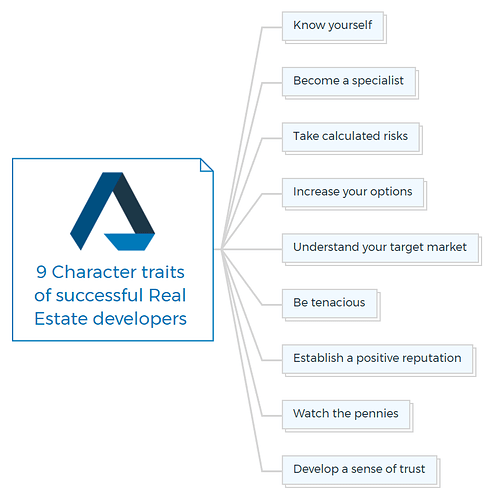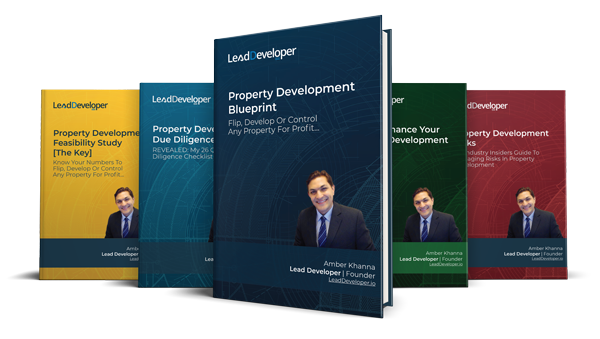Characteristics of successful Real Estate developer
Before you jump in the development game, be honest and ask yourself the following questions:
-
Do you have the necessary skills and experience to take on real estate projects? If not, you need to explore and develop the 8 skills required for real estate property developers.
-
Is it feasible for me to take time off from my regular employment to manage the new building?
Below are some crucial characteristics that are a must for a real estate developer…
Know yourself
Because property development can be divided into numerous categories, it’s critical to understand your restrictions before starting a project.
Your financial resources, understanding the sort of development, a network of advisers, and knowledge of the local conditions are just a few of them.
Furthermore, do you have the ambition and determination to complete the project? Do you have a strong desire to pay attention to minor details? You will reap the benefits of your efforts if you plan well and visualize your outcome.
You are missing out if you haven’t yet subscribed to our YouTube channel.
Become a specialist
You must become an expert to become a successful real estate developer. You must gain as much industry expertise as possible to earn this status.
This does not necessarily imply that you must return to school and study for several years. Reading books about property development and investment is one of the practical options.
Read your local newspaper’s real estate section, attend seminars, join local industry associations, learn to network with individuals in your property circles, query industry experts or professionals, and, most importantly, learn from your own experience.
Knowledge is power, and with it, you’ll be able to make well-informed decisions and reduce risk in whatever project you’re working on.
There is another easy alternative.
Just enrol in one of my property development courses, and you will be on the way to becoming a real estate expert.
Take calculated risks
There is no such thing as gambling in property development, which means that every decision you make is scrutinized before taking action.
Consider both good and bad aspects.
By anticipating potential problems, you will be better prepared to prevent them. Take a sheet of paper, list the negatives on the right and the positives on the left.
If the advantages outnumber the concerns, you should be able to move forward with confidence. You will need to address the destructive aspects first before moving further.
Increase your options
Property development is a dangerous business, and being adaptable is an excellent way to protect yourself. Never become emotionally attached to any project you’re working on.
If things don’t seem to be going your way, especially from a business standpoint, be ready to walk away from a project.
If you’ve spent a lot of time and effort refining a notion to the point of obsession, it’s easy to slip into the emotional trap of attachment.
You must think of at least six different ways to make the situation work to maximise your alternatives. Remember that, even with the best-laid plans, anything can happen.
Understand your target market
Some individuals believe that you must be born with an instinct or feel for the real estate market. Many successful people, including Rupert Murdoch, Bill Gates, and Steven Spielberg, to mention a few, have an instinct for their respective fields.
The property game isn’t much different for a developer. Learning and keeping up with market trends become crucial for those not blessed with any such instinct.
One approach to achieve this is to use market surveys, but keep in mind that they are not always accurate and costly.
Another strategy to assess your market is to solicit feedback from everyone (including your friends, financial adviser, coworkers, and, of course, your marketing agent) before making a decision.
For example, if you’re developing a piece of land, find out what residents in the neighbourhood think about local schools, stores, transportation, and crime.
Learn More
Be tenacious
If you have a great plan and a strong feeling that you will succeed but run into roadblocks like a shortage of funds or council opposition, fight back or strategise your way around the issue.
Confrontation isn’t always the most excellent strategy because it alienates vital stakeholders, which might cause delays in your efforts.
A better approach is to think laterally and devise tactics that benefit everyone (or almost everyone) in the end.
Some developers believe that if they do not receive project approvals within a particular time, they have missed a market opportunity and should cancel the project.
If you can’t come up with a solution that will please all parties in a fair amount of time, walk away and look for another opportunity; there will always be another one around the corner.
Establish a positive reputation
The construction industry is littered with tales of shoddy work and poor service, and we frequently hear of developers touting and selling substandard goods.
It’s easy to spend a lot of money on promoting your development, but if you don’t offer what you promised, people will eventually find out, and you’ll wind up losing even more money in the long run.
There are no shortcuts in this business if you want to make money. Success necessitates meticulous attention to detail, and, as with any other business, high-quality service is critical.
Remember that, in most cases, the customer is correct and that it is best to resolve a problem as soon as possible rather than allowing it to fester and become out of hand.
This approach will help you establish yourself as a reliable and trustworthy developer.
Property Development Books - “Starter-Pack”
18 Property Development Books To Get You Started Now
Includes 18 x detailed eBooks
✓ Property Development Checklist - 6 Pages
✓ How To Finance Your Property Development Project? - 13 Pages
✓ Property Development Team - 19 Pages
✓ Site Acquisition Process - 14 Pages
✓ The Ultimate Guide To Getting Started In Property Development - 42 Pages
✓ My Secret Property Development Process - 28 Pages
✓ How To Nail Your Next No Money Down Deal? - 29 Pages
✓ Industry Insiders Guide To Managing Risks In Property Development - 26 Pages
✓ How To Become A Property Developer? - 41 Pages
✓ Do You Have What It Takes To Be A Property Developer? - 12 Pages
✓ 7 Common Mistakes Made By Property Developers & How To Avoid Them? - 12 Pages
✓ 5 Reasons, Buy & Hold Property Investors Fail At Property Development - 16 Pages
✓ 10 Financial Mistakes Made By Property Investors & Developers - 54 Pages
✓ My 26 Question Due Diligence Checklist - 21 Pages
✓ Property Development 101: The Feasibility Study - 34 Pages
✓ Property Development 101: Construction Guide - 55 Pages
✓ Property Development Blueprint - 66 Pages
✓ Your Definitive Guide To Property Options - 36 Pages
Watch the pennies
Save the pennies, and the pounds will look after themselves.
This should be a prerequisite for any development project. We frequently hear about initiatives that go over budget and fail.
Spend only where it’s required to sell your growth; don’t go overboard, and certainly don’t spend to appease your ego (that is, by undertaking a more extensive scale development to show-off amongst your friends). Learn to be frugal and never to throw money away.
Maintain rigorous financial discipline by obtaining at least three quotes to compare and, most importantly, having everything in writing.
Treat all of your suppliers and contractors with respect; pay them promptly if they deliver the goods or services on time.
Of course, if they don’t follow through on their promises or overcharge you, call them right away and complain.
Develop a sense of trust
Developers who want to get repeat business and high-quality referrals should develop a trusting business network. To earn this confidence, the developer must constantly operate in the best interests of his business partners and the community.
The developer should exhibit skill and tell the truth to get trust. They should not make up an answer to a question if they don’t know the answer; otherwise, they will be found out quickly. They must execute a task on time if they commit to it.





